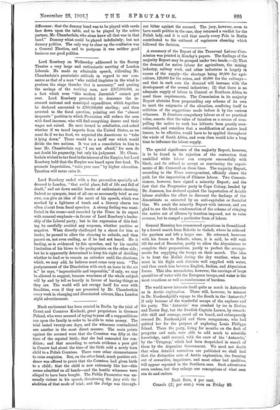Much excitement has been created in Berlin by the trial
of Count and Countess Kwilecki, great proprietors in German Poland, who were accused of trying to pass off a supposititious son upon the family in order to be able to raise money. The trial lasted twenty-one days, and the witnesses contradicted one another in the most direct manner. The main points against the accused were that the Countess was fifty at the time of the reputed birth; that she had concealed her con- dition; and that according to certain evidence a poor girl in Cracow had about the time of the birth sold a newly born child to a Polish Countess. There were other circumstances to raise suspicion. But, on the other hand, much positive evi- dence was offered to prove that the Countess had given birth to a child ; that the child is now extremely like her—this seems admitted on all hands—and the hostile witnesses were alleged to have been bought. The Public Prosecutor was un- usually violent in his speech, threatening the jury with the abolition of that mode of trial; and the Judge was through- out bitter against the accused. The jury, however, seem to have smelt politics in the case, they eturned a verdict for the Polish lady, and it is said that nearly every Pole in Berlin contributed to the outburst of rapturous cheering which followed the decision.


















































 Previous page
Previous page